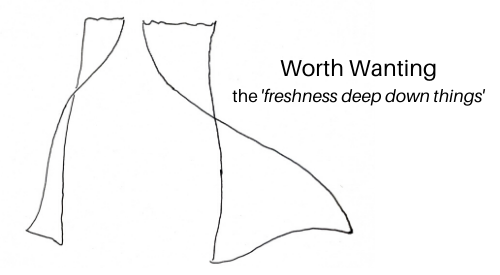
A literal response to a literal manifestation: the beginning of an encounter, and a come-on-in to freshness.
By literal I mean raw and unprocessed perceptions and responses, without metaphor, without allegory, not representing anything else, not standing for anything else. So my literal response to your present yourself, and your response to my mine, as well as my response, and then my response to… and on and on, is basic dynamic of encountering.
Later on, especially in reflection, indications are followed up on, inferences are drawn, implications made, but the kernel of the experience is sincerely itself, a literal response to a literal manifestation.
We’re not talking about ‘the thing in itself’, that controversial topic, but about the basic building block of any true and worthwhile relationship with the world and others: literal experience.
The issue of insincerity is very alive today, but it has been through all history. Currently, convictions about it have been generalized from heuristical to presumptive, and produced an ideology of insincerity claiming that the world, and the people in it, are not what they seem, that what they appear to be is not what they are, and what they say is not what they mean, that the world is one vast bad-faith dissimulation. There are obvious attitudinal consequences of this ideology. Face value is for fools. All messages are manipulations. Skepticism is savvy and irony is intelligence. Only detachment has dignity.
In this view, the literal is merely the prompt or the pretext of some theater which is really what’s going on, really what matters. Those who take the literal as anything more serious than that are naive, innocent, credulous.
Encounters, however, do begin with literalism. Each one has a literal response by itself, in itself, to the literal manifestation of the other of itself. And these responses back and forth in a feedback spiral are the driving energy and the grounding of the encounter. In our apprehension of that complex exchange and of its reverberations deep within us, freshness manifests itself in the wonderful way it does: new horizons, new interest, new ideas, and a new sense of the livingness of the other, and of ourselves.
The apparatus of intelligence works on and with this raw experience as curator, commentator, counselor, which is essential work. Here we practice comparison between words and deeds, appearance and reality, so as to understand what to trust and what not, what is worthwhile and what not. The literal may not be the whole truth, but it is some truth, not the wholly worthwhile, but of some value. It is the place to begin, not a presumption, but an apprehension.
The encounter is the place that engages with the literal, and if not at all, then it is not an encounter, and not hospitable to freshness.
A way to be ready for encounters is to think ahead of time about some of our literal responses that we can share with any other we encounter.
For instance, I’ve been asking myself each day a set of three questions: what recently did I find impressive, what intriguing, and what intimately touching.
These are deep questions. What impresses us speaks to our finitude and its limits; what intrigues speaks to our attitudes and their blindnesses; what intimately touches us speaks to our solitude and isolation.
So, for instance, yesterday, I walked on the whole the Allandale Urban Wild wall from beginning to end, up and down the rocky ledges and through the woods. What an impressive piece of work.
Yesterday also, in a poetry salon, I found myself wondering what it was that others found so compelling in the voice, but I didn’t.
Yesterday, final example, my wife and I started a journey of reading a book together: chapter one of Atlas of a Lost World: Travels in Ice Age America. Being travelers together in a strange land made each of us more aware of the presence of the other.
If every day I have a set of these very literal responses to share with you or anyone, then we’re well on our way to encounter.
